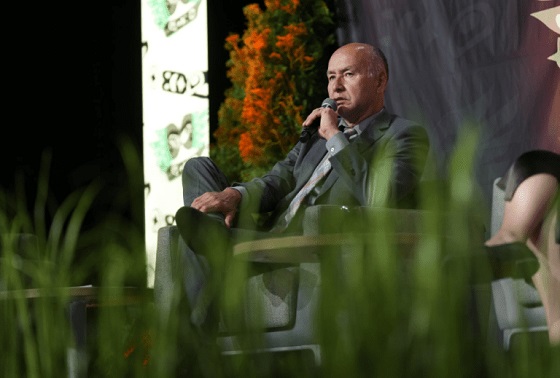Alberta
Alberta and Ontario sign agreements to drive oil and gas pipelines, energy corridors, and repeal investment blocking federal policies

Alberta-Ontario MOUs fuel more pipelines and trade
Alberta Premier Danielle Smith and Ontario Premier Doug Ford have signed two memorandums of understanding (MOUs) during Premier Ford’s visit to the Calgary Stampede, outlining their commitment to strengthen interprovincial trade, drive major infrastructure development, and grow Canada’s global competitiveness by building new pipelines, rail lines and other energy and trade infrastructure.
The two provinces agree on the need for the federal government to address the underlying conditions that have harmed the energy industry in Canada. This includes significantly amending or repealing the Impact Assessment Act, as well as repealing the Oil Tanker Moratorium Act, Clean Electricity Regulations, the Oil and Gas Sector Greenhouse Gas Emissions Cap, and all other federal initiatives that discriminately impact the energy sector, as well as sectors such as mining and manufacturing. Taking action will ensure Alberta and Ontario can attract the investment and project partners needed to get shovels in the ground, grow industries and create jobs.
The first MOU focuses on developing strategic trade corridors and energy infrastructure to connect Alberta and Ontario’s oil, gas and critical minerals to global markets. This includes support for new oil and gas pipeline projects, enhanced rail and port infrastructure at sites in James Bay and southern Ontario, as well as end-to-end supply chain development for refining and processing of Alberta’s energy exports. The two provinces will also collaborate on nuclear energy development to help meet growing electricity demands while ensuring reliable and affordable power.
The second MOU outlines Alberta’s commitment to explore prioritizing made-in-Canada vehicle purchases for its government fleet. It also includes a joint commitment to reduce barriers and improve the interprovincial trade of liquor products.
“Alberta and Ontario are joining forces to get shovels in the ground and resources to market. These MOUs are about building pipelines and boosting trade that connects Canadian energy and products to the world, while advocating for the right conditions to get it done. Government must get out of the way, partner with industry and support the projects this country needs to grow. I look forward to working with Premier Doug Ford to unleash the full potential of our economy and build the future that people across Alberta and across the country have been waiting far too long for.”
“In the face of President Trump’s tariffs and ongoing economic uncertainty, Canadians need to work together to build the infrastructure that will diversify our trading partners and end our dependence on the United States. By building pipelines, rail lines and the energy and trade infrastructure that connects our country, we will build a more competitive, more resilient and more self-reliant economy and country. Together, we are building the infrastructure we need to protect Canada, our workers, businesses and communities. Let’s build Canada.”
These agreements build on Alberta and Ontario’s shared commitment to free enterprise, economic growth and nation-building. The provinces will continue engaging with Indigenous partners, industry and other governments to move key projects forward.
“Never before has it been more important for Canada to unite on developing energy infrastructure. Alberta’s oil, natural gas, and know-how will allow Canada to be an energy superpower and that will make all Canadians more prosperous. To do so, we need to continue these important energy infrastructure discussions and have more agreements like this one with Ontario.”
“These MOUs with Ontario build on the work Alberta has already done with Saskatchewan, Manitoba, Northwest Territories and the Port of Prince Rupert. We’re proving that by working together, we can get pipelines built, open new rail and port routes, and break down the barriers that hold back opportunities in Canada.”
“Canada’s economy has an opportunity to become stronger thanks to leadership and steps taken by provincial governments like Alberta and Ontario. Removing interprovincial trade barriers, increasing labour mobility and attracting investment are absolutely crucial to Canada’s future economic prosperity.”
Together, Alberta and Ontario are demonstrating the shared benefits and opportunities that result from collaborative partnerships, and what it takes to keep Canada competitive in a changing world.
Quick facts
- Steering committees with Alberta and Ontario government officials will be struck to facilitate work and cooperation under the agreements.
- Alberta and Ontario will work collaboratively to launch a preliminary joint feasibility study in 2025 to help move private sector led investments in rail, pipeline(s) and port(s) projects forward.
- These latest agreements follow an earlier MOU Premiers Danielle Smith and Doug Ford signed on June 1, 2025, to open up trade between the provinces and advance shared priorities within the Canadian federation.
Related information
Alberta
Jason Kenney’s Separatist Panic Misses the Point

By Collin May
Time was a former political leader’s expected role was to enjoy retirement in relative obscurity, resisting the urge to wade into political debate. Conservatives generally stick to that tradition. Ralph Klein certainly did after his term ended. Stephen Harper has made no attempt to upstage his successors. Yet former Alberta Premier Jason Kenney can’t seem to help himself.
From the boardroom of Bennett Jones, one of Calgary’s oldest law firms, Kenney recently offered his thoughts on the unspeakable horrors that await the province should it entertain a debate (perhaps even call a referendum) on separating from Canada. While dismissing Alberta separatists as a “perennially angry minority”, Kenney nevertheless declared a vote on separation would “would divide families, divide communities, divide friends for no useful purpose.” Business partnerships, church and community groups, even marriages and families would break apart, he warned, “shredding the social fabric of the province.”
It was a remarkable burst of untethered hyperbole, but it says more about the former premier than it does about the province he once led.
Kenney’s take on the history of Alberta separatism is telling. It’s a 50-year-old “discredited concept,” he said, whose acolytes “couldn’t get elected dogcatcher in this province.” Exhibit A in his analysis was Gordon Kesler, an Alberta rodeo rider and oil company scout who believed independence was the only way to save Alberta from Ottawa’s depredations. In a 1982 byelection, Kesler got himself very much elected as an MLA under the Western Canada Concept banner. He later lost in the general election to Peter Lougheed’s Progressive Conservatives, but Lougheed did not belittle Albertans for entertaining separatist notions. Instead, he asked for a mandate to fight Ottawa more effectively — and got it.
Kenney, by contrast, ridicules separatists while simultaneously painting them as an existential menace. Worse, he likens them to followers of Vladimir Putin and (perhaps even worse?) Donald Trump. “[I]f you just follow them on social media,” he claimed, one will quickly see that they cheered on Putin’s attack on Ukraine and Trump’s threat of making Canada the 51 st state.
Kenney’s latest intervention fits a pattern. As premier from 2019 to 2022, he could not resist trying to stamp out dissent. During the pandemic, he alienated political allies by dismissing their concerns about mandatory vaccines with contempt. He saw his ouster as UCP leader as the result of a Trumpian-inspired or “MAGA” campaign. UCP party faithful, however, said their rejection of him had far more to do with his top-down leadership style and habit of “blaming other people for the errors he made.”
What’s especially striking about Kenney’s separatist obsession is that he seems to understand as little about Albertans now as he did while premier. Albertans have long debated separation without the province descending into chaos. When Kesler won his seat, people talked about separation, argued its pros and cons, but couples were not running to their divorce lawyers over the issue and business partners were not at each other’s throats.
And there are legitimate reasons for concern about Canada’s social and political structure, as well as the role provinces play in that structure. Canada’s institutions operate largely on an old colonial model that concentrates power in the original population centre of southern Ontario and Quebec. This has not, and does not, make for great national cohesion or political participation. Instead, it feeds constant fuel to separatist fires.
The current threat to Canadian identity comes as well from the ideological commitments of our federal government. Early in his time as Prime Minister, Justin Trudeau declared Canada to be a “post-national” state. This sort of moniker is consistent with the popularly-designated woke doctrine that eschews the liberal nation-state, democratic procedures and individual freedom in favour of tribalist narratives and identity politics.
The obsession with post-nation-state policies has initiated the dissolution of the Canadian nation regardless of whether Quebeckers or Albertans actually vote for separation. We are all becoming de facto separatists within a dissolving Canada, a drift that current Prime Minister Mark Carney’s ineffective “elbows up” attitude has done nothing to reverse.
Kenney’s panicked musings about Alberta separatists would have us believe the province need only continue the fight for a better deal within the Canadian federation. Kenney pursued just such a policy, and failed signally to deliver. For too many Albertans today, his advice does not reflect the political reality on the ground nor appreciate the worrying trends within Canadian institutions and among our political class.
Kenney likes to associate himself with Edmund Burke, the father of conservatism and defender of venerable institutions. But Burke was known as much in his day for his sympathies with the American revolutionaries and their creation of an experimental new republic as he was for his contempt towards the French Revolution and its Reign of Terror. Burke’s conservatism still linked real actions with true words. It would be advisable, perhaps, to keep our own political language here in Alberta within the bounds of the plausible rather than fly off into the fanciful.
The original, full-length version of this article was recently published in C2C Journal.
Collin May is a lawyer, adjunct lecturer in community health sciences with the Cumming School of Medicine at the University of Calgary, and the author of a number of articles and reviews on the psychology, social theory and philosophy of cancel culture.
Alberta
Alberta Is Where Canadians Go When They Want To Build A Better Life

From the Frontier Centre for Public Policy
One in three Canadians chooses Alberta to start over. But to stay Canada’s top destination, it must fight Ottawa’s barriers and complacency
No province has captured the Canadian imagination quite like Alberta—and not because of oil.
One in three Canadians leaving their provinces in the past five years headed to Alberta. They were escaping stagnant wages, high housing costs and suffocating bureaucracy. They came for freedom and opportunity, and Alberta delivered. Its edge is cultural: it rewards enterprise instead of strangling it.
The question now is whether Albertans can keep that edge before Ottawa and complacency close in.
Prosperity, like liberty, vanishes the moment people stop fighting for it. If Alberta wants to remain Canada’s economic engine, it must continue to move forward, tearing down old barriers while fending off the new ones that Ottawa and other provinces are always erecting.
The cost of standing still is staggering.
Economists say provincial trade barriers (rules that prevent goods, services, and workers from moving freely) cost the Canadian economy up to $130 billion a year. For Alberta, even a 10 per cent reduction would be worth $7.3 billion a year.
When Quebec killed the Energy East pipeline that would have carried Alberta crude to eastern refineries, Alberta lost the chance to export oil worth as much as $15 billion annually.
That’s not theory. That’s lost paycheques, lost tax revenue and public services that never materialized.
Alberta has always been more willing than others to break free from the barriers that hold back growth. Liquor sales were privatized decades ago, as were property registries. The New West Partnership with Saskatchewan, Manitoba and B.C. opened labour mobility and procurement, though it has since stalled. Alberta doesn’t impose cultural tests and it doesn’t levy a provincial sales tax. Families arrive because life here is easier. They can work, start a business, raise kids or simply breathe without bureaucrats looking over their shoulder.
But cracks remain. Liquor shelves may be free, but the Alberta Gaming, Liquor and Cannabis Commission monopoly clogs the warehouse. Professional associations in law, teaching and health care are slow to recognize credentials and drown their members in red tape.
Procurement often tilts local, because, apparently, free markets stop at the city line. And like every other province, Alberta still bows to Ottawa’s anticompetition telecom rules, the dairy and poultry cartel and the banking oligopoly, systems that consistently benefit Quebec farmers and Bay Street lenders at Alberta’s expense.
And as if the old cracks weren’t enough, new barriers are appearing. One of the worst is protectionism. Canadians love mocking Donald Trump’s tariffs, yet happily embrace the same thing at home. “Buy local” sounds warm and fuzzy but props up cartels in groceries, banking, telecom and construction. The truth? We’ve imposed more barriers on ourselves than Trump ever dreamed of.
Prime Minister Mark Carney exemplified the problem when he promoted subsidies for canola farmers. It was a double insult. First, it showed Ottawa would rather hand out cash than negotiate hard. Second, it reminded farmers that the “help” isn’t free. They pay for it through their own taxes, scooped from Saskatchewan and Alberta, laundered through federal bureaucracy, then mailed back with a ribbon.
Carney also vowed that interprovincial barriers would vanish by July 1, 2025. That deadline came and went. His shiny new “process” for expediting infrastructure looks like more of the same: more Ottawa mediation that risks slowing everything down.
But it isn’t only economics standing in the way. Ideology is becoming a barrier of its own. Diversity, equity and inclusion has morphed into a system for entrenching gatekeepers. It compels people to think and act in ways they didn’t choose. It drains productivity, creates make-work compliance jobs and sorts people into categories. Worst of all, it punishes anyone who doesn’t conform. Alberta resists this infection better than most, but its universities and federally dependent agencies are already hooked.
Then comes debanking. In 2022, Ottawa showed how quickly it could freeze accounts, and banks complied without hesitation. Since then, regulators have only expanded their reach under the banner of anti–money laundering and climate policy. The message is blunt: if Ottawa decides your sector is undesirable, access to financial services can vanish. For Alberta, with its energy industry branded a planetary threat, this is no hypothetical.
A free economy is meaningless if citizens can be financially exiled from it by decree. Alberta must shield its people by turning ATB, its provincially owned bank, into a fortress institution and enshrining access to financial services as a civil right.
So what does moving forward mean? It means doubling down on being the most desirable province to live and work. That requires bold reforms. Cut regulators down to size. Protect banking access in law. Decentralize big-city governments to make them more accountable and give residents real choices. Reform health care to expand choice and slash wait times. Deregulate housing and trucking to lower costs. Confront public-sector unions that act as ideological monopolies.
Canada loves to brag about free trade, but governs like a feudal kingdom. Alberta has already shown that a freer path is possible. The task now is to resist cartels, fight the banks, tear down old walls and stop new ones from rising.
Alberta has always been a frontier of builders, risk-takers and prosperity seekers, and to thrive it must keep moving. If Alberta leads, it will stay prosperous and desirable. If it falters, doors will close.
The choice is clear: Alberta can either be strangled by regulations or break free and keep its frontier spirit alive.
Marco Navarro-Genie is vice-president of research at the Frontier Centre for Public Policy and co-author, with Barry Cooper, of Canada’s COVID: The Story of a Pandemic Moral Panic (2023).
-

 National10 hours ago
National10 hours agoCanada’s birth rate plummets to an all-time low
-

 Crime9 hours ago
Crime9 hours agoPierre Poilievre says Christians may be ‘number one’ target of hate violence in Canada
-

 Alberta8 hours ago
Alberta8 hours agoJason Kenney’s Separatist Panic Misses the Point
-

 Automotive11 hours ago
Automotive11 hours agoBig Auto Wants Your Data. Trump and Congress Aren’t Having It.
-

 Aristotle Foundation2 days ago
Aristotle Foundation2 days agoEfforts to halt Harry Potter event expose the absurdity of trans activism
-

 Bruce Dowbiggin2 days ago
Bruce Dowbiggin2 days agoCanada’s Humility Gene: Connor Skates But Truckers Get Buried
-

 Energy2 days ago
Energy2 days ago“It is intellectually dishonest not to acknowledge the … erosion of trust among global customers in Canada’s ability to deliver another oil pipeline.”
-

 Energy2 days ago
Energy2 days agoIn the halls of Parliament, Ellis Ross may be the most high-profile advocate of Indigenous-led development in Canada.




